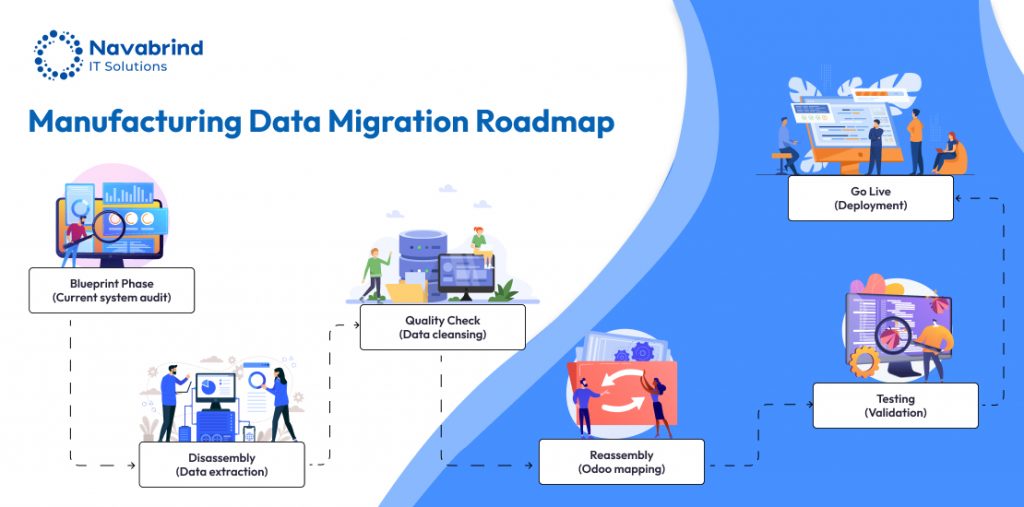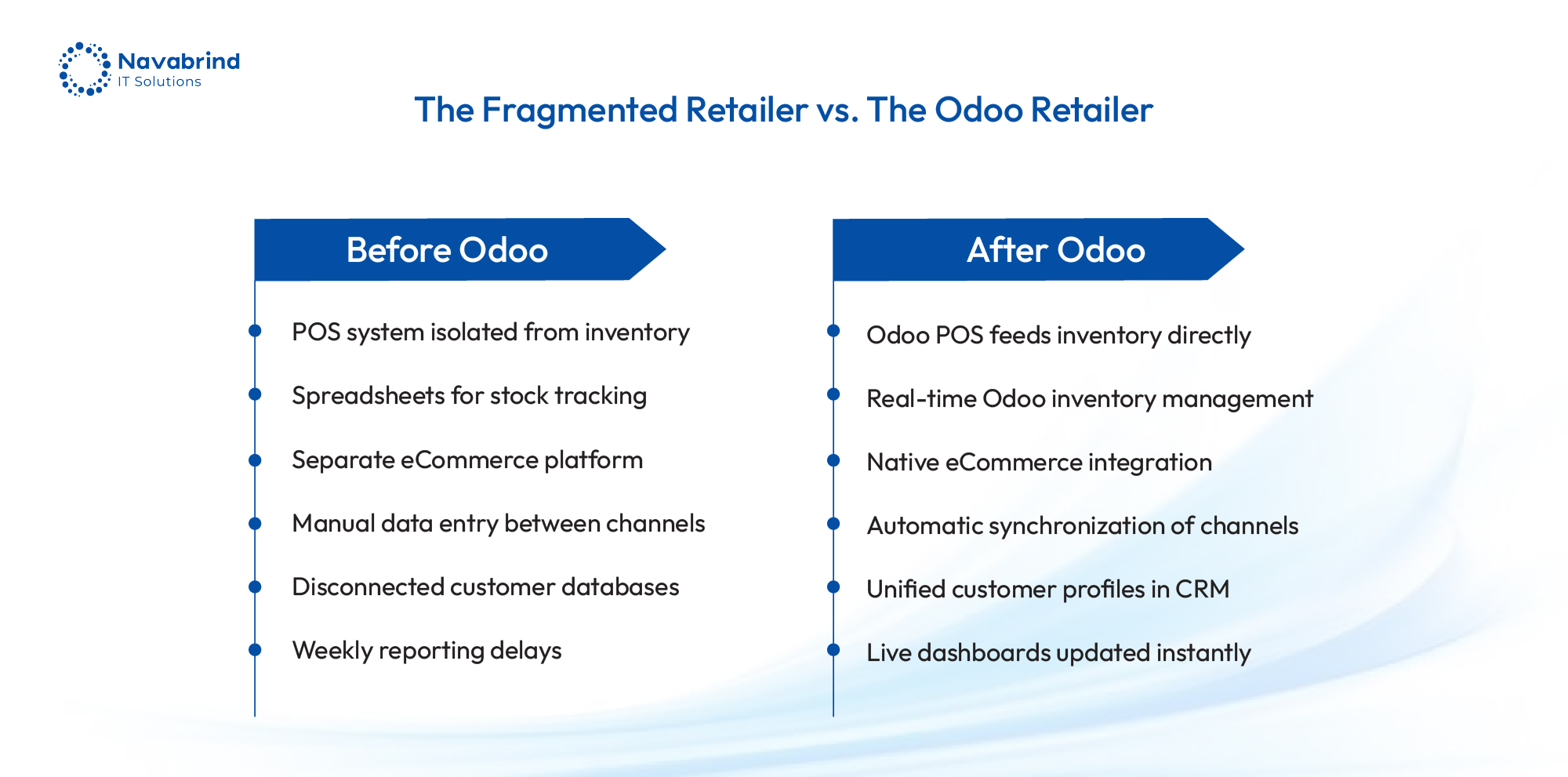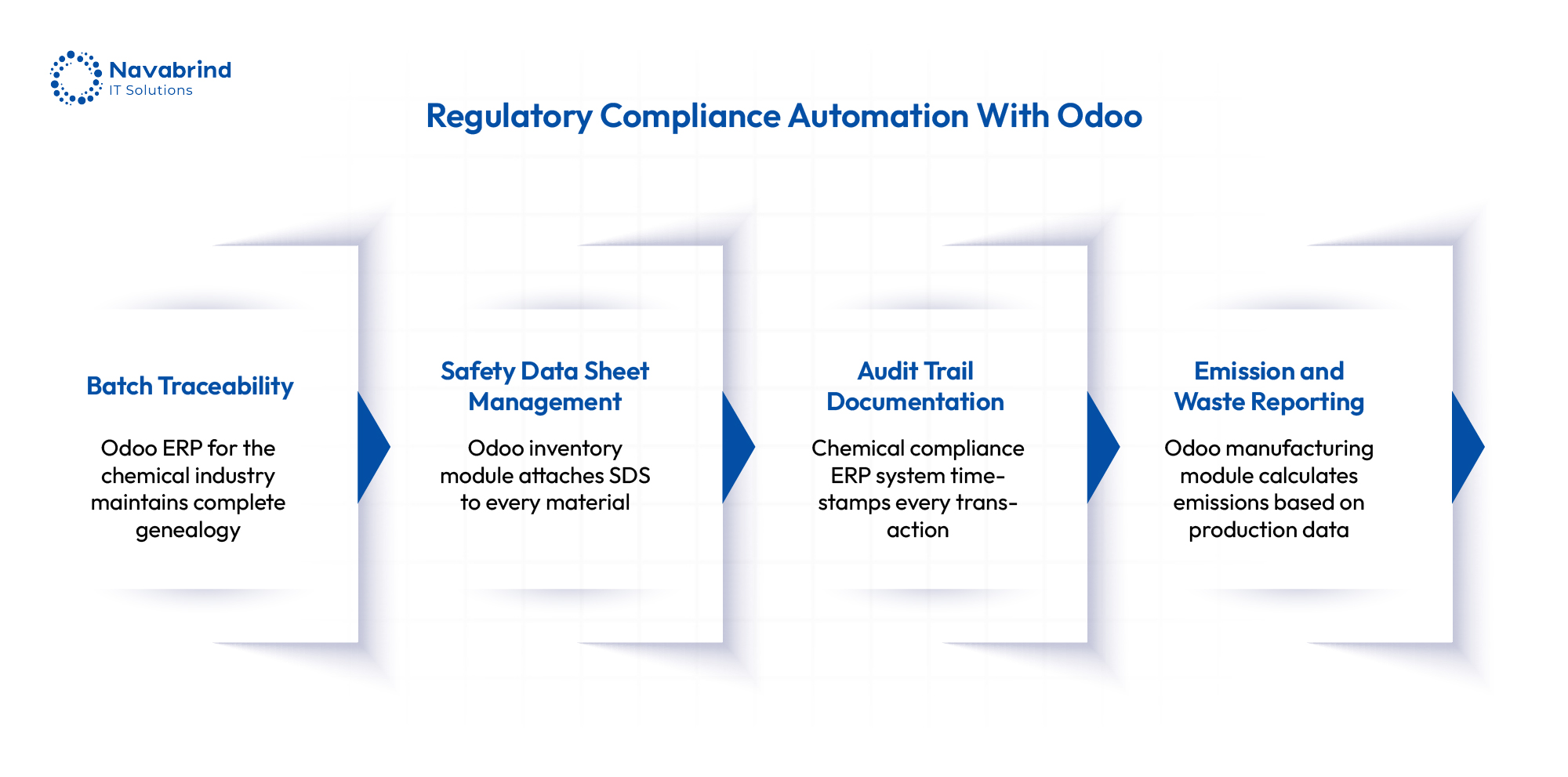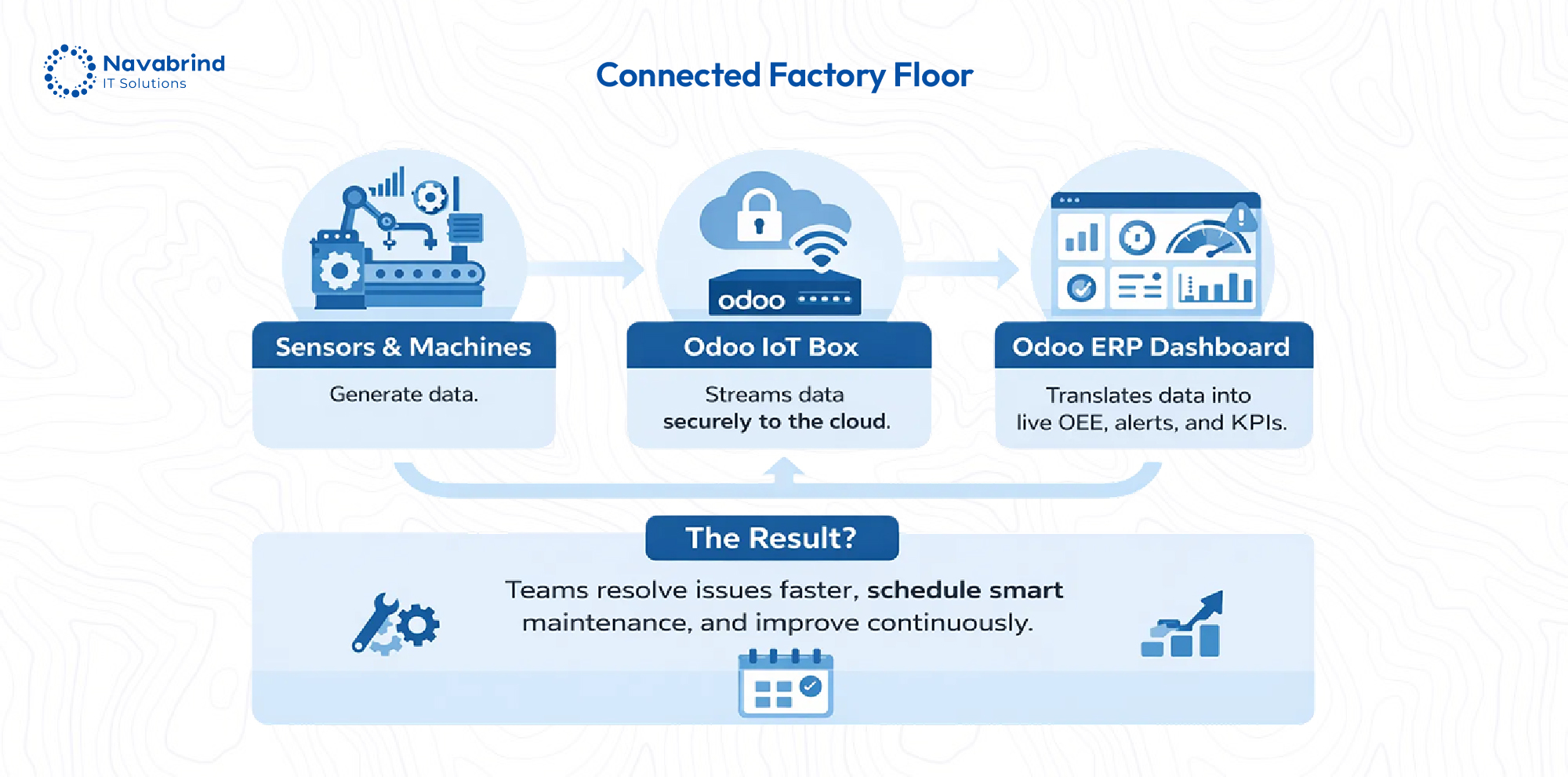ERP Data Migration Services for Manufacturers: Why Odoo is the Best Fit
- September 9, 2025
- Posted by: Tony
- Categories: Blog, Odoo
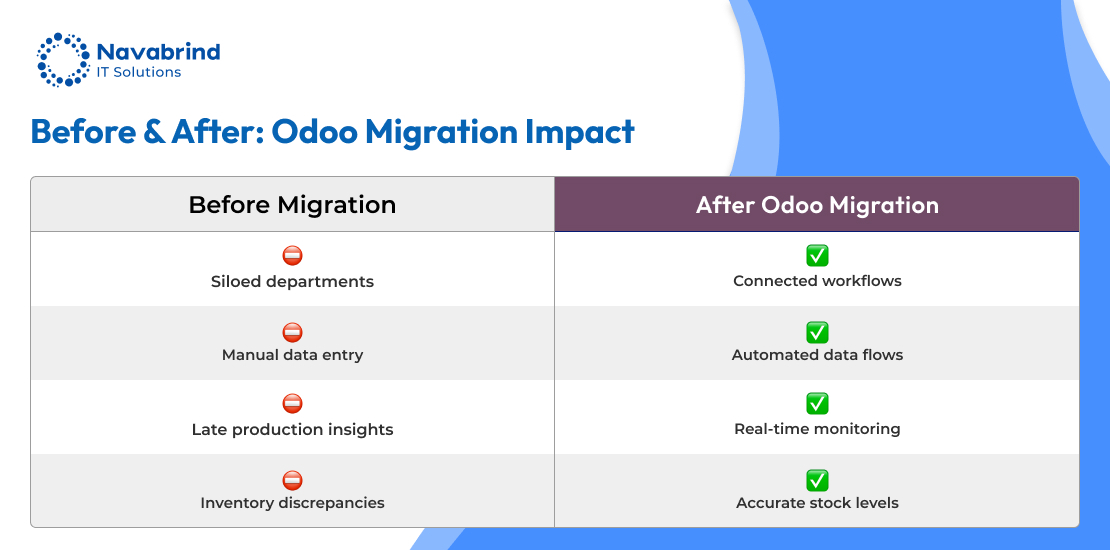
Odoo has become a top choice for manufacturing companies looking for reliable ERP solutions. The platform serves millions of users worldwide and expects to continue its aggressive market growth. The enterprise version of Odoo ERP comes packed with advanced features built for complex manufacturing operations. Users can track work center efficiency and set up automated replenishment systems. The platform’s improved architecture handles large datasets and this is a vital factor when manufacturing operations need to process complex data like supplier details and multi-level BOMs.
Understanding Manufacturing Data Migration Challenges
Manufacturing companies struggle with moving their operational data to Odoo ERP systems. Studies show that 55% of data migration projects go over budget. This happens because of complex integration needs and hardware dependencies and can be solved with Odoo ERP data integrity and security.
Manufacturing data migration comes with unique challenges because production systems are complex. Data quality problems show up in 80% of migration projects. This leads to longer timelines and puts a strain on resources. The task becomes harder with multiple data sources, especially those with proprietary protocols and legacy manufacturing systems.
Bad data migration hits manufacturing operations hard in several ways. Workers waste up to 27% of their time fixing data-related problems. This delays production schedules. Manufacturing companies lose money because of system downtimes and data inconsistencies during the move.
Key Migration Success Metrics for Manufacturers
Manufacturing data migration success depends on measurable performance indicators. Manufacturing dashboards need to combine critical KPIs into central displays to monitor production immediately. The best metrics follow SMART guidelines – specific, measurable, actionable, realistic, and time-based. These metrics track:
- Data completeness and accuracy rates
- System performance before and during migration
- Production downtime during transition phases
- Post-migration data validation success rates
Manufacturing companies that use proper data validation at every migration stage see fewer disruptions. Immediate analysis through interactive dashboards helps plant managers track migration progress. This way they retain operational control. Find a robust solution to data security concerns with Odoo ERP data integrity and security.
Essential Benefits of Odoo ERP Migration for Manufacturers
Odoo’s manufacturing module excels at centralizing and automating production processes.
Live Production Monitoring and Control
Odoo’s IoT integration lets manufacturers connect their machinery directly to the ERP system. This captures vital machine data like uptime, downtime, and energy usage. Production managers can track machine status through dynamic dashboards that help reduce downtime by quickly responding to problems. The system shows production line performance in real time, which helps quickly shift resources when bottlenecks occur.
Integrated Quality Management Systems
The quality module in Odoo ERP makes manufacturing operations stronger with systematic quality checks during production. The system flags any deviations from set parameters to minimize waste and improve product consistency. Quality control procedures blend naturally with work orders to meet required standards at every production step. The platform also keeps detailed records of materials, processes, and certifications that make regulatory compliance simpler.
Advanced Inventory and Supply Chain Features
Odoo’s inventory management optimizes manufacturing operations through:
- Stock replenishment that runs automatically based on set levels
- Control of multiple warehouses from one interface
- Live inventory movement tracking
- Production planning based on actual demand
The system’s integrated approach keeps materials available when needed and prevents production delays. Manufacturers can maintain ideal stock levels while cutting carrying costs through automated material requirements planning. The platform’s design lets manufacturers add the tools they need based on their specific requirements, making it adaptable for production environments of all types.
Strategic Data Migration Planning
Data migration to Odoo needs careful planning and systematic execution. Research shows that 38% of data migration projects don’t meet their goals because of poor planning.
Pre-migration Assessment and Data Cleanup
A full picture of your data is essential for successful migration. Companies should identify critical information they need to migrate instead of transferring everything. This data has production schedules, raw material orders, vendor details, and customer histories. About 40% of data migration projects cost more and face delays due to poor data quality. Companies should remove duplicates, fix errors, and standardize data formats before starting the transfer process.
Creating a Migration Timeline and Milestones
Company size and complexity determine the implementation timeline. Small companies can complete migration in three to six months. Mid-sized businesses need six to twelve months. A detailed project plan with specific milestones helps track progress well. Your roadmap should account for:
- Production schedules that minimize operational disruption
- Testing windows for data validation
- Go-live dates with clear expectations
- Buffer time for unexpected delays
Resource Allocation and Team Structure
Resource allocation plays a key role in migration success. Your core migration team needs these specific roles and expertise:
- Project Manager: Oversees timeline adherence and resource coordination
- Data Migration Lead: Makes sure data converts accurately
- Data Architect: Designs compatible data frameworks
- Quality Analyst: Keeps data integrity throughout the process
- Business Analyst: Connects technical and business requirements
The team must work within budget constraints and meet scheduled milestones. Manufacturing companies often need to coordinate with production schedules. This helps minimize disruption to daily operations.
1. Odoo ERP data integrity and security
Data security is the life-blood of a successful ERP implementation for manufacturing companies. A complete approach to protect sensitive information needs encryption, access control, and strong recovery mechanisms.
2.Data Encryption and Access Control Measures
Manufacturing companies must implement end-to-end encryption for data both at rest and in transit. Multi-factor authentication acts as a basic security measure that reduces unauthorized access risks. Role-based access control helps manufacturers limit data exposure by giving permissions based on job functions and responsibilities.
3.Compliance and Regulatory Considerations
Manufacturing organizations must arrange their data protection strategies with industry-specific regulations. Companies in regulated sectors need to follow standards like GDPR, HIPAA, and local data protection laws. Regular audits help companies stick to standards like ISO 27001 and without doubt strengthen data protection frameworks.
Backup and Recovery Protocols
A complete backup strategy creates the foundations of data integrity. Manufacturing companies should keep three full copies of their data. Two copies should be stored locally on different media types and one copy offsite. Regular recovery testing verifies backup integrity and gives swift data restoration capabilities. A good backup protocol should have these key elements:
- Automated backup scheduling based on data criticality
- Secure offsite storage with appropriate environmental controls
- Regular checks of backup integrity through restoration testing
- Clear documentation of recovery procedures and responsibilities
Regular backup testing and documented recovery procedures help manufacturing companies maintain business continuity and protect against data loss. These security measures help manufacturers protect their valuable operational data throughout the migration process.
Manufacturing companies that choose Odoo as their ERP solution get the most important benefits from its specialized features and reliable architecture. The success of data migration depends on careful planning, proper resources, and strict security protocols.
Our complete analysis reveals that successful Odoo implementation needs:
- Pre-migration assessment and data cleanup
- Timeline planning with clear milestones
- Team structure with defined roles
- Security measures and compliance protocols
- Backup and recovery testing
Manufacturing organizations following these guidelines experience smooth transitions and achieve better operational efficiency. Odoo’s up-to-the-minute data analysis capabilities, quality management systems, and advanced inventory features give manufacturers the tools they need in modern production environments.
Data security stays crucial throughout the migration process. Companies must set up reliable encryption, access controls, and backup protocols while following regulatory compliance. This strategy will give both data integrity and business continuity during and after the transition.
Manufacturing companies ready to adopt digital transformation through Odoo will find this piece valuable. Proper planning and execution investments pay off through improved productivity, better quality control, and optimized operations.
Frequently Asked Questions
Q1. How does Odoo benefit manufacturing companies?
Odoo ERP migration for manufacturing companies offers a comprehensive suite of tools that drive efficiency, enhance operational control, and support long-term scalability.
- Real-Time Production Monitoring: With Odoo, manufacturers can gain real-time visibility into their production processes, track work center efficiency, and identify bottlenecks. This allows them to make data-driven decisions to optimize operations.
- Integrated Quality Management Systems: Odoo integrates quality control checkpoints into manufacturing workflows, ensuring adherence to quality standards while minimizing defects.
- Advanced Inventory Features: Features like automated replenishment, batch tracking, and multi-warehouse management streamline inventory processes, reducing downtime and avoiding stockouts.
- Odoo ERP Migration for Manufacturing Data Integrity and Security: The platform ensures secure data handling, safeguarding sensitive production data and enabling manufacturers to meet regulatory requirements.
- Odoo ERP Performance Management: By analyzing production metrics and resource utilization, manufacturers can continuously optimize performance and improve ROI.
In addition to these features, Odoo ERP migration for manufacturing ensures seamless integration with existing systems, enabling businesses to modernize without disrupting core processes.
Q2. What are the key challenges in manufacturing data migration?
Migrating data for manufacturing companies presents unique challenges, especially when dealing with legacy systems and complex production workflows.
- Data Quality Issues: Legacy systems often house outdated, inconsistent, or redundant data, which can complicate the migration process.
- Integration of Multiple Data Sources: Consolidating data from various tools, such as inventory systems, ERP platforms, and production databases, can be technically challenging.
- Hardware Dependencies: Manufacturing environments may rely on older machinery with software that isn’t easily compatible with modern ERP systems.
- System Downtimes: Improperly planned migrations can lead to production halts, impacting revenue and customer commitments.
- Data Inconsistencies: Poor data mapping or incomplete migration processes can result in misaligned or lost information.
By addressing these challenges, businesses can ensure that their Odoo ERP migration for manufacturing maintains operational efficiency during the transition.
Q3. How can manufacturers ensure successful data migration to Odoo?
Ensuring a successful data migration to Odoo requires careful planning, rigorous testing, and collaborative execution.
- Thorough Pre-Migration Assessment: Analyze the current data landscape to identify inconsistencies, redundancies, or gaps. This helps in setting realistic migration goals.
- Data Cleanup: Clean and standardize data before migration to eliminate errors and ensure compatibility with Odoo.
- Strategic Timeline Planning: Develop a detailed project plan with milestones, factoring in production schedules to minimize disruptions.
- Resource Allocation: Assign a dedicated team with defined roles, including data experts, IT staff, and manufacturing leads.
- Odoo ERP Migration Testing: Conduct multiple testing iterations in a sandbox environment to identify and address issues before going live.
- Compliance and Security: Implement industry-specific compliance protocols and robust security measures, including encryption and regular backups, to safeguard sensitive data.
These steps help ensure a smooth transition, preserving data integrity and operational continuity during the Odoo ERP migration for manufacturing.
Q4. What security measures should be implemented during Odoo data migration?
Security is paramount during data migration, as sensitive information like production data, supplier contracts, and financial records is at risk.
- End-to-End Encryption: Use encrypted channels for data transfer to protect information from unauthorized access.
- Multi-Factor Authentication (MFA): Implement MFA to ensure only authorized personnel can access critical systems during migration.
- Role-Based Access Control: Assign roles and permissions to restrict access to sensitive data based on user responsibilities.
- Compliance with Regulations: Adhere to industry-specific regulations, such as GDPR or ISO standards, to maintain compliance and avoid penalties.
- Comprehensive Backup Strategy: Create and regularly test data backups to ensure recovery in case of migration failures.
- Odoo ERP Data Integrity and Security: Use Odoo’s built-in tools to validate data accuracy and integrity after migration, ensuring seamless integration into the new system.
Implementing these measures ensures a secure, compliant, and disruption-free data migration process.
Q5. How long does it typically take to migrate to Odoo for manufacturing companies?
The timeline for migrating to Odoo ERP varies depending on factors such as the complexity of operations, the size of the organization, and the quality of the existing data.
- Small Companies: Typically require three to six months for migration due to their relatively simpler workflows and smaller datasets.
- Mid-Sized Businesses: May need six to twelve months to complete migration, given the complexity of their processes and the integration of multiple systems.
- Detailed Project Planning: A comprehensive plan should account for production schedules, migration testing, user training, and potential delays.
- Odoo ERP Migration Testing: Allocating time for rigorous testing ensures that all processes function as intended before going live.
- Odoo ERP Platform Compatibility: Evaluating compatibility with existing tools and machinery is crucial to avoid delays caused by integration challenges.
A well-structured approach ensures that the migration process aligns with business goals, minimizes disruptions, and sets the foundation for long-term success with Odoo ERP for manufacturing.
Schedule a conversation with us now!
Related Articles
-
Post
Odoo ERP for the Retail Industry: Driving Efficiency and Growth
Odoo ERP for the Retail Industry: Driving Efficiency and Growth February 27, 2026 Posted by: Vasanth Anantharaman Categories: Blog, Odoo for Retail industry No Comments Why the Retail Industry Runs Better on Odoo ERP Retail runs on dozens of disconnected apps. One tool for sales, another for stock, a third for loyalty. None speak to -
Post
From Formula to Forecast: Odoo’s Transformative Edge in Chemical Manufacturing
From Formula to Forecast: Odoo’s Transformative Edge in Chemical Manufacturing February 27, 2026 Posted by: Jaishree Jayabal Singh Categories: Blog, Odoo ERP for Chemical Industry No Comments Odoo ERP for Chemical Industry Solves the Disconnection Problem Chemical manufacturing operates across multiple fronts, production floors, warehouse storage, laboratory testing, and regulatory reporting. Managing these as isolated -
Post
How Odoo ERP Helps Manufacturers Track Machine Efficiency and Move Toward Industry 4.0
How Odoo ERP Helps Manufacturers Track Machine Efficiency and Move Toward Industry 4.0 February 25, 2026 Posted by: Venkadesh Nagarajan Category: Uncategorized No Comments The Shift Toward Smart Manufacturing Machine efficiency is the core of manufacturing. Without it, cost control and scalability are impossible. Industry 4.0 accelerates this, merging IoT and data analytics to drive
How can we help you?
Get in touch with a solutions consultant that can share best practices and help solve specific challenges.






